Barefoot and muddied, a group of youngsters sprinted across a makeshift pitch in rural Vietnam, passing the ball in a game of touch rugby in a country where few people have ever heard of the sport.
They belong to Vietnam’s only rugby program for locals, rolled out for kids in a remote commune where some players have to travel by boat to training sessions often held against a backdrop of rice terraces and curious onlookers.
Few knew anything about rugby when they joined the scheme, marveling at the egg-shaped ball, but are now keen fans planning to closely follow the Rugby World Cup in Japan, which starts in September.
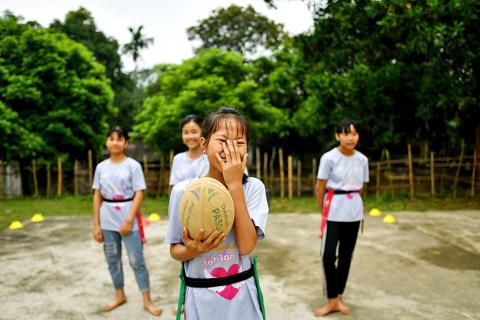
Photo: AFP
“I haven’t watched international rugby ... but if possible I will surely watch the Rugby World Cup,” said 14-year-old Bao Cham, a player on the Silver Fox team in Kim Boi District.
With the first Rugby World Cup held in Asia, organizers are hoping to boost rugby’s popularity in backwaters like Kim Boi, where most kids count Lionel Messi as a hero, but have never heard of New Zealand great Dan Carter.
Vietnam is one of the few countries in Southeast Asia with no rugby federation, and international games are not regularly aired on cable TV.
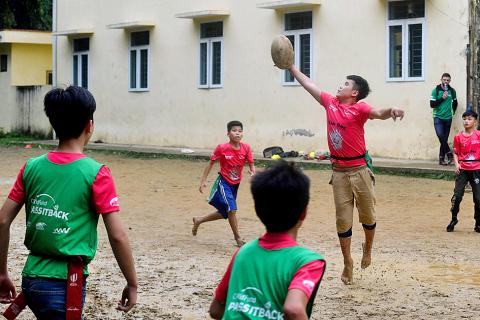
Photo: AFP
That means the sport remains on the margins, making the rugby clinic in Kim Boi something of an oddity.
Launched in 2015, the ChildFund Pass It Back program is aimed at teaching youngsters life skills, with lessons on health or planning for the future interspersed with rugby training sessions.
The players, aged 11 to 16, meet regularly on weekends to play touch rugby, which has none of the full-contact version’s heavy tackling.
There are more than 6,100 players and coaches in the program today, more than half of them female, in Vietnam, Laos, East Timor and the Philippines.
Some players will go to Japan with ChildFund — traveling by airplane for the first time — for rugby training and life skills sessions.
Rugby was not the most obvious choice. Soccer, volleyball and sepak takraw (kick volleyball) were also floated as options when the program was piloted in Laos, but rugby was considered the most gender-neutral.
“The young girls in the commune wanted to try this new sport that they had never seen before, it wasn’t considered a boys’ sport,” said John Harris, regional operations officer for the scheme.
Still, some participants in Vietnam had to push back again entrenched sexism.
Coach Bui Thi Lan was told by her in-laws that she should give up rugby after marrying and having a baby — in line with expectations that women should avoid playing rowdy sports.
Lan would have none of it. She returned to coaching four months after giving birth and now teaches 60 kids four times per week.
“Rugby brought me money so that I could take care of myself, working and studying at the same time,” she told reporters at a training session, in which she fed her baby between modules.
Battling inequality was not the only hurdle. There was no vocabulary in Vietnamese for the sport and some terms were coined on the fly.
A scrum is mai rua, which means “turtle shell” in Vietnamese, while the name for rugby is simply bong bau duc, which translates to “oval ball.”
Rugby was not always so foreign to Vietnam, although it has never been widespread among locals. The French are believed to be the first to introduce rugby to the country, and an excerpt from a 1933 telephone book describing the Saigon Sports Stadium notes a rugby pitch with stands for 3,000 spectators.
Today there are no professional Vietnamese-born players abroad — although France flyhalf Francois Trinh-Duc is of Vietnamese origin — and just a small group of expatriates playing recreationally in Hanoi and Ho Chi Minh City.
However, the game is not totally unfamiliar in Vietnam, as it echoes aspects of the traditional vat cau new year festival that sees shirtless men wrestle for possession of a large wooden ball on a field.
Now Vietnam’s budding young rugby stars hope that the sport will start to gain popularity.
“I really wish that Vietnam would participate in Rugby World Cup one day, and I hope to be a member of that team,” 17-year-old coach Bui Van Nhan told reporters.
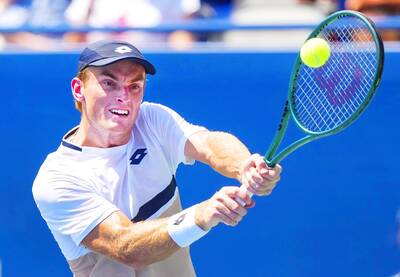
TAIWANESE EXITS: Fellow Australian Christopher O’Connell joined Tristan Schoolkate as a winner following his 6-1, 6-2 defeat of Tseng Hsin-chun Australian qualifier Tristan Schoolkate on Monday dispatched rising Brazilian talent Joao Fonseca 7-6 (7/5), 6-4 at the ATP Toronto Masters, ensuring a breakthrough into the world top 100. The 24-year-old from Perth moved to 98th in the ongoing live rankings as he claimed his biggest career victory by knocking out the ATP NextGen champion from November last year. Schoolkate, son of a tennis coach, won his first match over a top-50 opponent on his sixth attempt as he ousted the world No. 49 teenager from Brazil. The qualifier played a quarter-final this month in Los Cabos and won through qualifying for his
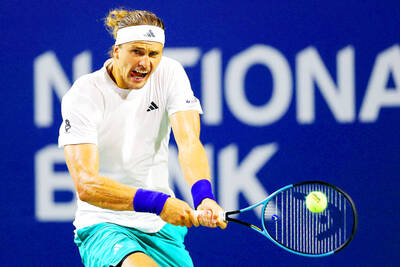
Top seeds Alexander Zverev of Germany and American Coco Gauff on Tuesday advanced to the third round of the Canadian Open after both players were pushed hard by their opponents. World No. 3 Zverev, playing in his first match since his first-round loss at Wimbledon, was far from his best, but emerged with a 7-6 (8/6), 6-4 win over Adam Walton under the lights in Toronto. Momentum shifted firmly in Zverev’s favor when he won a 52-shot rally in the first set tiebreak and he sealed the win on a double fault by the Australian in the second set. “It was a very
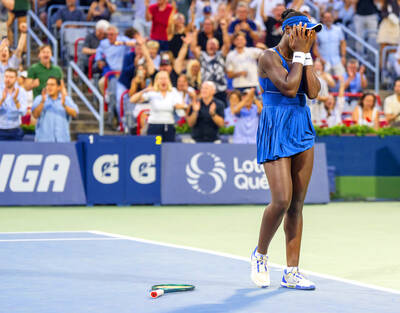
Canadian teenager Victoria Mboko upset top-seeded Coco Gauff 6-1, 6-4 on Saturday night to reach the National Bank Open quarter-finals. “Your support was incredible,” Mboko told the crowd in French after a chorus of “Ole, Ole, Ole” chants echoed around the venue. “I’m really happy to win today ... It’s incredible. I’m so happy to beat such a great champion.” Gauff dropped to 2-3 since winning the French Open. She followed the major victory with opening losses in Berlin and Wimbledon, then overcame double-fault problems to win two three-set matches in Montreal. Gauff had five double-faults on Saturday after having 23 in

Formula 1 champion Max Verstappen on Thursday said that he is staying with the Red Bull team next year, ending months of speculation over his future. “Some people just like to stir the pot, some people just like to create drama, but, for me, it’s always been quite clear, and also for next year,” the four-time champion said ahead of the Hungarian Grand Prix. “I’m discussing with the team already the plans — the things that we want to change for next year, so that means that I’m also staying with the team for next year,” he said. Verstappen has a contract with